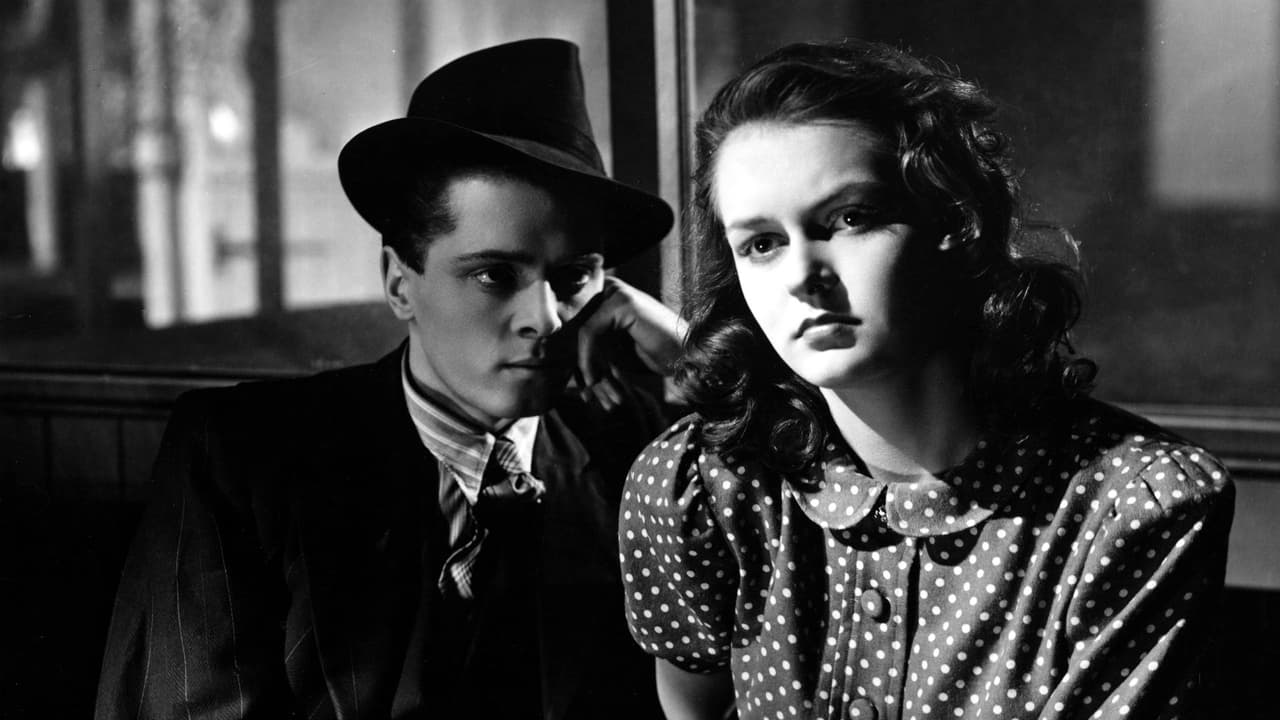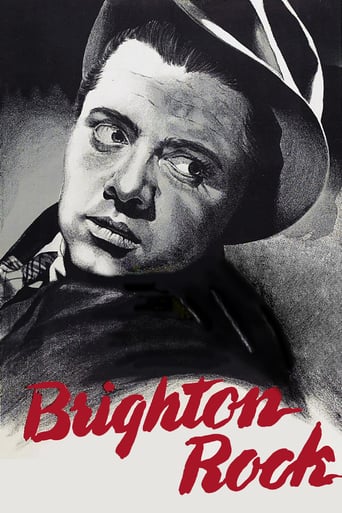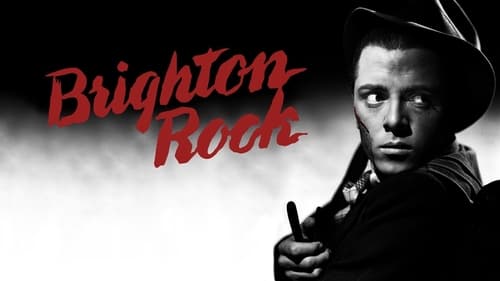


the audience applauded
... View MoreGood concept, poorly executed.
... View MoreBrilliant and touching
... View MoreI am only giving this movie a 1 for the great cast, though I can't imagine what any of them were thinking. This movie was horrible
... View MoreThe beach getaway town of Brighton, England, during and after WWII had a gangster under-class and Pinkie Brown (Richard Attenborough) epitomizes its sinister decay in John Boulting's hoodlum classic "Brighton Rock". A newspaper man is sent to Brighton as a part of a gimmick to bust his newspaper's circulation. The newspaper man had a history with the gang and their revenge leads to murder. A mess up in the murder develops into the ruin of the gang and sets Pinkie on a self-destructive course. Pinkie is irredeemably bad and the young Attenborough inhabits the part, few film characters are portray as clearly and unremittingly as this. The relationship he has with a young waitress is selfish and cruel. "Brighton Rock" makes all this real and a screen play by Graham Greene is top notch. Considered number one among the British hoodlum movies, this film, smooth and thoughtful, delivers.
... View MoreThis movie is famous for the tough and uncompromising way in which it depicts the types of gangsterism that were prevalent in Brighton in the period between the two world wars. Based on Graham Greene's classic novel of the same name, "Brighton Rock" is a story about revenge, murder and Catholic guilt but most of all; it's about a troubled young gang leader and the action he takes to deal with a series of problems. Threats that emanate from the existence of a more powerful rival gang, dissent within his own gang and a potential witness whose evidence could get him executed are just a few of his concerns but then as a Roman Catholic, he's also sharply aware of where his violent journey is taking him and tormented by his inability to change course.Pinkie Brown (Richard Attenborough) is the new leader of a small gang whose original leader (William Kite) was killed following the publication of a newspaper article written by journalist Fred Hale (Alan Wheatley). One of the gang recognises Hale's picture in "The Daily Messenger" in a section that advertises a promotion that the paper is due to carry out in Brighton in the next few days in which Hale, operating under the name Kolley Kibber, will be handing out cash prizes to people who recognise him. When this piece of information is drawn to the attention of Pinkie, he becomes determined to take revenge on Hale for bringing about the death of the only person he really cared about.During the gang's pursuit of Hale through the streets and pubs of Brighton, the terrified journalist tries to befriend some women including a seaside entertainer called Ida Arnold (Hermione Baddeley) in the hope that being in their company might offer him some protection. Eventually, however, he tries to keep out of sight on a ghost train but is horrified to suddenly find Pinkie sitting next to him. By the time the train reaches the end of its journey, it's carrying one passenger less than it started with and Hale's body is washed up on the shore some hours later.As part of his promotional work, Hale had distributed a number of cards around the resort and in an effort to provide himself with an alibi for the time of the murder, Pinkie arranges for gang member Spicer (Wylie Watson) to carry on delivering the Kolley Kibber cards after Hale's death. Pinkie is later alarmed to discover that Spicer had left a card at a local café and becomes very anxious about the possible consequences if he was seen doing so. In order to try to safeguard himself, Pinkie goes to the café and befriends a young waitress called Rose (Carol Marsh) who has a very clear memory of the man who left the card at one of her tables.Ida Arnold is very suspicious about the circumstances surrounding Hale's death and becomes determined to see that the culprit is brought to justice. Pinkie's continuing efforts to cover up his crime lead to him killing Spicer and marrying Rose to ensure that, as his wife, she won't be able to give evidence against him. Things continue to get more difficult for Pinkie for a variety of reasons and lead him to decide that another killing is necessary but the events that follow don't pan out as he'd planned.As well as being notable for its realism, "Brighton Rock" also features a collection of memorable characters, top class dialogue and some superb expressionistic cinematography that contributes so much to the grim atmosphere of the piece. Inevitably though, it's the character Pinkie Brown and Richard Attenborough's amazing performance that leaves the most indelible impression on anyone who's seen this film. The very young Attenborough is perfect as the ruthless 17-year-old psychopath whose belief in the existence of Hell is incredibly strong and the contribution of the supporting cast is also consistently good.
... View MoreThere was no action and not much substance to it. Attenborough held the same expression (moody) throughout and there was a pathetic female character in it who really epitomised everything I hate about a lot of films made in the black and white period; over-the-top, whiny, clingy and acting completely without passion or skill. I believe the film was supposed to be character-driven but as the main character was more silent than talkative, an audience wouldn't really be able to explore the depths of his persona. Given Attenborough's one expression, I don't think his character had any other sides to his personality. If his character was a word it would be 'monosyllabic'.
... View MoreCold, cutthroat and bleak is the tone of Brighton Rock; one of the best lines of the film arriving in the form of an individual whom states that it'd be a "good idea to throw his case down there with him", so as to doubly make it look like he fell when trying to paint a murder involving a worn out banister as an accident on the victim's behalf. On another occasion, two of the members visit a hapless man at an ungodly hour demanding money; his wife is very ill and he can't pay, but that doesn't stop them cutting up his face and spitting on his floor on the way out. Brighton Rock is cold like that, chilling in its portrayal of how these people operate. The film carries that sort of air, the sort that sees mostly everyone who comes into contact with these people and their fearsome leader are individuals whose lives and well-being gradually decline, in what is a fearsome and greatly involving 1947 British piece set in between the two World Wars.The film will open warmly and welcomely, like a tourist film shot to bring in those from outside of Brighton as typical iconography in the form of a beach, on a hot day, with children happily playing on them complete with everyone else enjoying the warm weather is given to us. But, as the opening title card informs us, Brighton is apparently not all what it seems; and the consequent diving into the brooding, ugly side of the town as all the typical surface content is observed is knowingly delivered. The opening sequence even goes so far as to detail the place was only once rife with wrong-doing and corruption, "now, no more" suggesting a past tense to proceedings and that now everything is fine again; a strange would-be promise to the audience not to worry at any point during the film, as everything will end up rosy by the end. From here, the film's credits are eerily inter-cut with the lapping waves; again, an odd precursor to the film's ultimate conclusion in what happens to whom and where.The film revolves around the aftermath of a murder perpetrated by a small crew of thugs, a crew consisting mostly of men but with a final member of much younger ilk; a self proclaimed leader named Pinkie. The young thug is put across by way of a fantastic performance from Richard Attenborough, one that oozes evil; menace and a fair degree of sadism, but above all else, Attenborough convinces us this young man, the youngest of the gang, really has the drive and mind of someone capable of taking relentless command of such a crew and dominating. Our first altercations with him sees the film place Pinkie on the first floor of the terrace house they operate out of, as his minions chatter below and must venture up to inform him of some bad news, a sense of hierarchy established by way of a wildly angled shot looking directly below at the minions as one of them braves the stairs to go and see him. His first words, indeed, are a spitting insult later on in a public house directed at an employee about a middle aged woman across the room whom, ironically, becomes more involved later on.The murder in question is that of a man named Fred (Wheatley), who returns to Brighton for just the one day as a part of a newspaper game-come-promotion, but bumps into this vicious circle of thugs with whom he shares a history, and is promptly offed after some pleading and conversation. One would most certainly have wanted to see Fred's face the previous day when told by his newspaper employers he was to return to Brighton. Director John Boulting, adapting from a Graham Greene novel, nicely has the ensuing chase and murder spill out into what has been established as your more typical Brighton. The promenades, piers and fairgrounds appear harmless enough in the opening, but the cutting to the crew's dingy hideaway does not mean they're limited to such undergrowth, suggesting hatred and crime rife amidst the locals. When Fred runs, towards the bus station; the piers; the bars, anywhere, Boulting brilliantly applies a distorted hand-held aesthetic suggesting chaos and panic, a sense that he isn't in control which stands in perfect balance with that of his pursuers, whose accompanying compositions are steady and far calmer as they give chase: they're in total control of the situation, and the menace builds and builds to a harrowing conclusion.As the aftermath worsens, and middle aged woman Ida (Baddeley) grows increasingly suspicious - herself defying dominant uniformed male police officers that implore with her the case is closed, Pinkie instigates one of the more unbearable on screen flings in cinematic memory; the charging of himself with the seducing of a young waitress named Rose (Marsh), whom could place blame on Pinkie and his crew for Fred's murder, with what unfolds on that strand one gross love affair complete with its own sordid twists, turns and revelations. The gang must struggle with the occupying of the territory with another local gangster named Colleoni (Goldner), a man whom occupies a more exquisite place of dwelling when we see him in a hotel suite and speaks with a more sophisticated tone, further suggesting hierarchy. He runs a larger group of thugs Pinkie actually uses to help kill off one of his own; of whom the night before the execution Pinkie looms over as the victim lies on a bed, the difference in age resulting in nothing here as expressionistic lighting dominates the locale suggesting brooding menace and evil. The film is a masterclass in gangster detailing and crime fiction story telling, effortlessly branching out an array of characters; plots and subplots as a hostile, dramatic and intimate atmosphere is put across as these people merge resulting in it easily being one of the great British films.
... View More